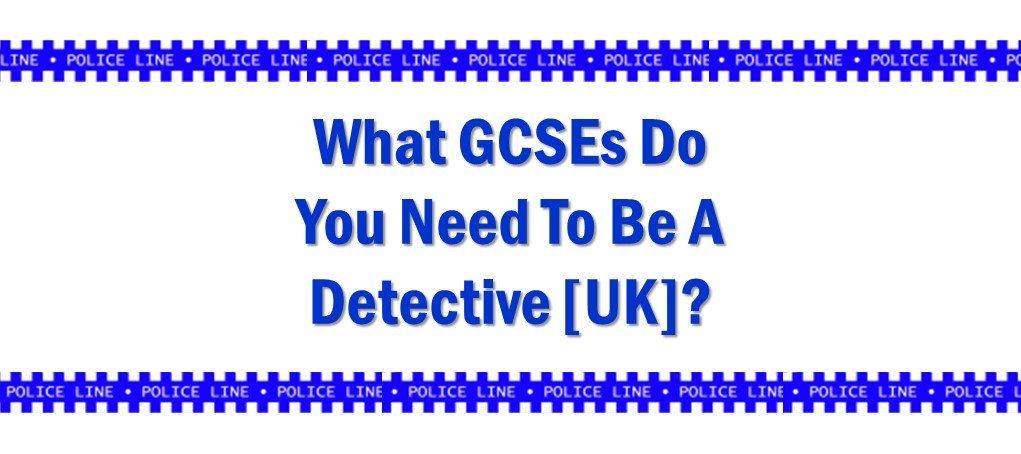With more and more complex crimes being commonplace, the police need more skilled detectives in order to tackle these criminals. A career as a detective can be a really rewarding one, so let’s get into what GCSEs you need to be a detective as well as some other important things that you need to know.
If you’re asking the question, what GCSEs do you need to be a detective, you’ve probably got your favourite cop show, whether its Vera, Strike, 24 Hours in Police Custody, The Unforgotten, or Death in Paradise, you’ve probably already got a view of what the role of a police detective is.
We hate to burst your bubble, but it’s not exactly as you see in your favourite detective show. Although, sometimes we wish it was!
For more on the reality of being a detective check out our article on Working in CID.
Although there are more detective roles than just working in CID available, this will give you a flavour of what to expect, so you can assess whether or not it is for you.
In short, though being a detective involves;
1. Detectives are trained to observe and analyse clues from crime scenes. They use their knowledge of human behavior to determine if someone committed a crime.
2. A detective can help find the person who committed a crime by looking at the evidence left behind. This includes fingerprints, DNA samples, other physical evidence, and digital evidence.
3. When a crime has been committed, detectives have to collect information about the crime scene. They may interview witnesses and suspects, search through evidence, and look for any clues that could lead them to the criminal.
4. After collecting the evidence, they have to analyse it to try to figure out what happened. This may be before, or after an interview, or both before and after interview.
5. In some cases, detectives might need to testify in court. If the case goes to trial, they would probably show the jury or a magistrate, the evidence collected and explain how they came to their conclusion.
6. Sometimes, they might even work undercover to catch criminals before they commit crimes.
All of the above does not happen in 60 minutes and is NOT done by one person as you see on TV.
Detectives will normally carry a workload of multiple different crimes that they are working on at any one time.
Enquiries can take a long time to complete, some of which will be completed by other departments. The workload and constant negotiation can be frustrating at times.
However, that being said, it can be a very rewarding role. Assuming we haven’t put you off, let’s look at what GCSEs you need to be detective in the UK.
How Would I Become A Detective? [Routes, Salary, Prospects, and more]
Historically, you would have had to spend a minimum of two years as a front line police officer (wearing a uniform and attending 999 calls). This is where you would ‘prove yourself’ as a police officer and pass your initial training.
It is during this period that a police officer is ‘learning their trade‘, if you are interested in becoming a detective, it is during this period that you will begin to hone your detective skills.
After two years you would be eligible to apply to become a detective if there was a vacancy.
Most new investigators would transition from front line policing to working in a volume crime team, or a prisoner processing team (all forces will call these teams by a different name).
Effectively, these departments will deal with ‘lower level’ crimes, such as low-value shop theft, and low-value criminal damage.
Check out this article for more on Police Abbreviations.
These will carry a high workload, but the complexity of which will be low.
The natural progression after this is that officer who has ‘proved themself’ as good investigators at the lower level, they will move on to investigating more complex crimes.
These are called PiP level 2 crimes, they are the next step up the complexity ladder. This could include crimes such as burglaries, drugs possession, serious violent crimes, and theft of vehicle offences. This list is not exhaustive.
After this, they will normally move on to specialise in an area, such as complex fraud, cyber crime, murderers, or sexual offences to name a few.
However, things have changed.
Now the police are offering direct entry routes to become a detective.
How Long Does It Take To Become A Detective In The UK?
How long it will take to become a detective depends on your entry route.
Some forces are offering entry routes that will see officers becoming a detective within two years.
Other people will decide years in that they want to become a detective.
Once you become a trainee detective, you will normally have 12 months to finish your detective portfolio.
What GCSEs Do You Need To Become A Detective?
The only GCSEs that you will need in order to become a detective are any 5 GCSEs, at Grade 4 or above, or grade C, depending on when you took your GCSEs.
Passes in English and Maths, are normally mandatory to most forces.
What Subjects Do You Need To Be A Detective [UK]
There are no specific GCSE subjects that you need in order to be a detective. Analytical subjects such as history may be of use to you as they will teach you to think in a critical manner.
Other subjects, such as psychology, may be of some use to you. There are no hard and fast rules. Our advice would be to do what interests you.
If you want to become a detective, it is more important to focus on getting your 5 GCSEs at grade 4 or above.
What About A GCSE In Criminology?
A GCSE in criminology may certainly be interesting to you if you want to become a detective. However, it is not essential.
Do I Need A GCSE In Law In Order To Be A Detective In The UK?
GCSE law is an interesting subject, there is no doubt, but this is not essential in any way for you to be a detective. You will be taught the legislation you need during training school.
If there is any legislation that you are unsure about as a detective, there are many databases you can look legislation up on, as well as ask colleagues!
What A Levels Do You Need To Be A Detective UK?
As with GCSEs, there are no specific A levels that you need in order to be a detective in the UK.
If fact, you do not need A levels at all. In order to join the police, you only need GCSEs, A levels are not mandatory.
What Should I Study At Uni To Become A Detective?
You do not need to study anything in particular at Uni to become a detective. Some of the best detectives I know have all had very different backgrounds. Not all have degrees, and those that do, have studied a wide variety of subjects.
How Much Do Detectives Earn?
Detectives earn the same amount as their operational counterparts. A detective constable will earn the same amount as a police constable. A detective sergeant will earn the same amount as a police sergeant, and so on.
For more on what police officers earn, check out our article on police pay scales.
Are you still wanting to be a detective? Hopefully, if you’re planning a career as a police detective, you now know what GCSEs you need to be a detective. If you are any other questions, pop them in the comments below, and we will answer them for you.





Do i need to do history or would u have the same chances to be a detective if u picked geography as a gcse? Does it not matter?
Hi, whether you pick history or geography does not matter, if you are intending on applying to be a police officer. Study what interests you as you are more likely to be sucessful, and enjoy what you are doing. Best of luck.